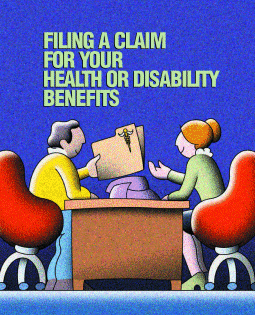Blog
Can a child get SSI in Ohio?
Can a Child Qualify for Social Security Disability Benefits? Many parents and guardians with children under the age of 18 wonder whether their children could qualify for Social Security disability benefits. Disabled children under the age of 18 can qualify for...

Social Security Disability benefit overpayments can be discharged in personal bankruptcy
Social Security Disability benefit overpayments discharged in personal bankruptcy Many of our clients are currently receiving benefits from the Social Security Administration because they are permanently disabled. So, what if Social Security attorney, John T....

Commonly asked Social Security Disability / SSI questions.
There are often basic questions about Social Security Disability benefits, so we have decided to answer just a few of them here.
Q 1. What does it cost to hire an attorney?
A 1. Nothing. Our firm does all SSD cases on a contingency basis. We take a percentage or pre-determined amount (determined under Statutes) of the back-pay you are awarded. If you are not granted SSD benefits, then we do not collect anything.
Q 2. Is there a difference between SSD and SSI benefits?
A 2. Yes. SSI is usually reserved for those individuals with very low incomes, and/or those that have not worked long enough in order to earn SSD benefits.
Q 3. How do I prove SSD eligibility if I do not have the money to visit a doctor?
A 3. This is one of the hardest issues for SSD applicants. On the one hand they are not working because they are disabled, and therefore, they do not have health insurance that allows them to visit a doctor. On the other hand, it is harder to prove SSD eligibility without documentation from treating physicians. Those that believe that they are eligible for SSD benefits ought to see a doctor as much as they can in order to build the strongest case. However, if you previously worked and had health insurance which allowed you to visit a doctor, we can use those records to prove your case. Check with our office and we will help determine the best course of action you should take.
Q 4. How long does it take to start receiving my benefits?
A 4. This is the hardest part for many applicants to understand. The SS offices are very overworked and any given case can take 1-2 years. However, if you never start the process, you will never receive benefits. it is better to get benefits in 1-2 years than not at all. You need to come into our office ASAP so that we can begin the process on your behalf.
Q 5. Do I have to be completely disabled in order to receive SSD benefits? NO and YES. No, you do not have to be completely disabled in the ordinary sense of that word. Meaning, you do not have to be bed-ridden or need round-the-clock assistance. However, you need to be completely disabled as that term is used in the federal Statutes. The definition in the federal statutes is much more broad and the vast majority of the people who can do normal daily activities are eligible for SSD benefits.
We hope this answers some basic questions for now. We will post more common questions and answers in the near future.

Closed period of disability and returning to work
Morrison & Nicholson gets several calls each month from people that had to quit work at some point due to their disability, however, they are now able to work as they did before and they want to know whether they are entitled benefits for the time they were disabled even though they have not yet applied for benefits. The answer we give them is as most answers law related, maybe.
First, you must have been disabled as defined by the Social Security Administration, that is, you must not be able to do any kind of substantial gainful activity for a continuous period of at least one year, or have an impairment that may result in death. If you were disabled for at least 1 year and then returned to work, the period that you were disabled is referred to as the “closed period” of disability. Although, you can file and receive benefits for the closed period of disability the application is only retroactive for a period of 1 year from the application submission date. For example, if you were disabled on March 2, 2007, returned to work in August 2008 and filed for benefits in March 2009, then you would only recieve benefits from the month that you were disabled from March 2008 – March 2009.

What is the Listing of Impairments for purposes of establishing disability?
What is the Listing of Impairments and is it used to establish disability?
The Listing of Impairments, also known as “The Listings, is set out in Social Security regulations. The listings are in two parts. Part A of the Listing of Impairments contains medical criteria that apply to the evaluation of impairments in adults age 18 and over. Part B of the Listing of Impairments contains additional medical criteria that apply only to the evaluation of impairments of persons under age 18. The listings are examples of common impairments for each of the major body systems that Social Security considers severe enough to keep an average adult from doing any gainful activity. See appendix 1 of subpart P of part 404 of Social Security’s regulations for the Listing of Impairments.
The listed impairments are of such a level of severity that Social Security considers a person whose impairment(s) meets or equals the Listing of Impairments to be unable to do any gainful activity, that is, the impairment(s) is expected to result in death, or to last for a specific duration, or the evidence must show that the listed impairment has lasted or is expected to last for at least 12 months in a row.
Many medical conditions are included in the Social Security Disability List of Impairments (including multiple sclerosis, rheumatoid arthritis, lupus, etc). However, keep in mind that you can still qualify for SSD / SSI benefits even if your illness is not listed on the Listing of Impairments.

What is the definition of “disabled” for purposes of an SSD determination
To be considered disabled for purpses of receiving Social Security Disability one must not be able to do any kind of substantial gainful activity for a continuous period of at least one year, or as an impairment that may result in death. The disability must be medically determinable. In other words there must be a medical basis either physically or mentally for the condition.
The Social Security Administration will consider your age, education, and work history along with your medical condition. For example, a 57 year old hard laborer who has degenerative disc disease along with rheumatoid arthritis that prevents him from doing the type work that he has always done in the past but is still capable of doing light work will likely be considered disabled because of his age, and lack of experience in other fields of work. In contrast, a 35 year old banker with an MBA from The Ohio State University that has a slight onset of fibromyalgia would find it much harder to fall within the SSA’s definition of disabled.

Social Security Marriage Requirement & the Deemed Valid Marriage Exception
In order to qualify for spouse’s benifits, the Social Security Administration requires that the spouse and the worker must have been legally married. That is, the marriage must be legally recognized by the state in which the marriage was entered into. Thus, if you have been residing in a state that recognizes your marriage as common law marriage (most states such as Ohio do not) then you will be considered legally married for purposes of recieving a deceased spouse’s Social Security benefits.
The only way that one can draw widower’s benefits without being legally married is if ALL of the following conditions are met, meeting Social Security’s “deemed valid marriage” provision.
– There was a marriage ceremony. Married social security
– The claimant married the working in good faith. In other words, the claimant thought the marriage to be valid.
– The claimant was residing with the worker at the time of his or her entitlement to benefits or at the time of death.
– No other person is entitled on the worker’s earnings record as a legal spouse.
– There was a legal impediment or a defect with respect to the marriage ceremony.
This exception is implicated in situations where the worker was already married at the time he or she married the claimant.

Social Security Disability and moving to another state
Social security disability and moving to another state
I thought I would briefly blog about a recent Client that found himself in quite a predicament due to some bad advice. The client originally filed for Social Security Disability in Ohio as he had a severe case of Chron’s disease along with two herniated intervertebral disk. Soon thereafter, the Client relocated to Alabama where he received his Social Security Disability claim denial letter. Client then retained an attorney in Alabama which requested a hearing. Unfortunately, for Client his attorney did not do his homework. Alabama is one of eight states that do not have a re-consideration step in the Social Security filing process. In other words when a claimant in Alabama has been denied for SSD he can skip the reconsideration filing and directly request a hearing. His attorney’s failure to file for reconsideration as required in Ohio delayed Client’s disability claim by at least a year.

How to terminate my Social Security Representative Payee?
Note: Be advised that if SSA believes your condition has improved to the point that you no longer need a payee, we may reevaluate your eligibility for benefits.
However, in my experience if your Representative Payee is an approved organization then your chances to be become your own payee are slim to none. The main reason being, that SSA has likely already done extensive screening due to the fact that they will only allow an organization to be a Payee Representative as a last resort. Most of these Organizational Payee Representatives charge a fee ranging anywhere from 25 dollars a month at some organizations here in Dayton up to 75 dollars a month in some larger cities such as Cleveland and Columbus.
Therefore, the best option in many cases for a person unhappy with their current Organizational Payee Representative is to simply request that the Representative be changed from to an Organization with lower fees or a family or church member that will agree to apply as a representive. All of this can be handled through your local Social Security Administration Office without the aid of an attorney.
Contact Us For A Free Consultation
If you have a personal injury, Social Security, or VA Benefit issue please contact the Law Offices of John T. Nicholson and schedule a free consultation today! Please Call us at 1-800-596-1533 or fill out our contact form by clicking the button below.

Free Case Evaluation
Free Case Evaluation
Law Offices of John T. Nicholson
Beavercreek
4461 Dayton Xenia Road
Dayton, OH 45432-1805
(937) 432-9775
Map & Directions
Columbus
1041 Dublin Rd #103
Columbus, OH 43215
(614) 384-5800
Map & Directions
Trotwood
2541 Shiloh Springs Road
Dayton, OH 45426
(937) 524-5922
Map & Directions
Kettering
5335 Far Hills Ave., Ste. 108
Kettering, OH 45429
(937) 524-5922
Map & Directions
Piqua
430 N Wayne St
Piqua, OH 45356
(937) 325-8500
Map & Directions
Springfield
150 N Limestone St #217
Springfield, OH 45501
(937) 325-8500
Map & Directions
Troy
22 N Market St
Troy, OH 45373
(937) 524-5922
Map & Directions
Mailing Address
P.O. Box 41450
Dayton, OH 45441
FAX: 1-800-801-1205
Beavercreek Office
4461 Dayton Xenia Road
Dayton, OH 45432-1805
(937) 432-9775
Map & Directions
Cincinnati Office
2021 Auburn Ave., Suite 105
Cincinnati, OH 45219
(513) 276-4677
Map & Directions
Columbus Office
1041 Dublin Rd #103
Columbus, OH 43215
(614) 384-5800
Map & Directions
Franklin Office
8 Stadia Drive
Franklin, OH 45005
(937) 432-9775
Map & Directions
Kettering Office
5335 Far Hills Ave., Ste. 108
Kettering, OH 45429
(937) 524-5922
Map & Directions
Piqua Office
430 N Wayne St
Piqua, OH 45356
(937) 325-8500
Map & Directions
Springfield Office
150 N Limestone St #217
Springfield, OH 45501
(937) 325-8500
Map & Directions
Trotwood Office
2541 Shiloh Springs Road
Dayton, OH 45426
(937) 524-5922
Map & Directions
Troy Office
22 N Market St
Troy, OH 45373
(937) 524-5922
Map & Directions
West Chester Office
7103 Cincinnati Columbus Rd
Cincinnati, OH 45069
(513) 276-4677
Map & Directions

Recent Comments